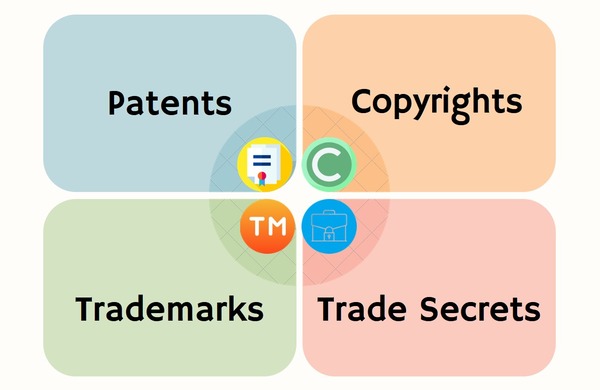Mastering Intellectual Property Protection for Your Innovations
- Date:
- Author: SVI Content Team
- Share:
The benefits of outsourcing to external organizations are saving time and cost, reducing inefficiencies and more. There’s a certain degree of truth there, but the flip side of the coin is, that potential risks associated with intellectual property (IP) when engaging in outsourcing need to be acknowledged. In an increasingly globalized world, the threat of IP infringement, including unauthorized copying or theft of proprietary works, poses significant harm to a company’s competitive edge and innovation.
Protecting intellectual property when outsourcing is paramount to shielding proprietary knowledge, maintaining market advantage and preserving the value of a company’s intangible assets.
This page will take an in-depth look at the meaning of intellectual property (IP) and explore four key types of IP. Furthermore, we will delve into practical strategies on how to protect intellectual property effectively in outsourcing operations. By understanding and implementing these strategies, organizations can lower their risk, strengthen their IP protection measures, and gain valuable revenue.
Part 1. What Is Intellectual Property?
Definition of Intellectual Property (IP)
Intellectual property refers to intangible creations with value that are unique yet protected by law. The legal system grants exclusive rights to use and transfer the outcomes of creation, making them the property of the creators. Others are not allowed to use the creations owned by the creator directly without his/her consent, otherwise it will constitute an intellectual property infringement.
In addition to intangibility and exclusivity, IP is characterized by timeliness and regionality.
The protection of intellectual property rights by law is temporal, it will not be available beyond the prescribed time, and if the registration is not renewed, the results of the creation will then be in the public domain where they will be utilized by others as a public resource.
As for regionality, if there are no international agreements, the legal force of IP rights is only valid within the territory of each country because the scope, content, and regulation of intellectual property protection are governed by the legislation of each nation. Therefore, it is necessary to be aware of the laws and regulations on intellectual property rights in different countries when conducting cross-border business or collaborations.
Types of Intellectual Property Rights (IPR)
What is considered intellectual property? As our society has grown and changed, the scope of protection of intellectual property rights has been improving, and it can cover a wide range of original works, inventions, innovations and other intangible assets. The most common types of intellectual property rights are patents, copyrights, trademarks, and trade secrets.
Patents: A patent is a legal right granted to an individual or organization to make, use or sell his product or invention for a certain period of time. Inventions and creations protected by the patent law can be machines, products, new technologies or new programs. An invention can be state-protected for a prescribed time as long as it is applied for through a national patent application. Without permission from patentees, no one can use the patented invention for any purpose.
Copyrights: A copyright is a right granted by law to a person or organization to reproduce, distribute, sell, display and perform a tangible work of authorship for a limited time. Literary, musical, artistic, and dramatic works such as articles, images, videos, website design and computer code can all be protected by copyright, but these creative works must be expressed in a tangible form to receive copyright protection.
Trademarks: Trademarks, consisting of distinctive names, symbols, designs, slogans and others, are approved for registration and protected by the Trademark Law. By printing them on the product, a label or a package, they are often used to differentiate and identify a company’s products and services from those of others and enable customers to recognize and associate specific qualities with a particular brand.
Trade Secrets: A trade secret is information that provides economic benefits and competitive advantages, yet is not disclosed to the public and is kept confidential using specific initiatives. It can be proprietary information such as company procedures, technological data, customer lists, marketing strategies, etc. This type of IPR protects against unauthorized use or disclosure of valuable proprietary knowledge, enabling companies to hold a competitive advantage.
Part 2. How to Protect Intellectual Property When Outsourcing?
To protect the company’s interests and advantages, taking measures to protect intellectual property is a top priority. Failure to prepare for such initiatives can have a dramatic impact on your company in case of intellectual property violations. The following strategies can be taken to enhance the protection of intellectual property, whether you are operating or collaborating in your home country or abroad.
1. Registering Patents, Copyrights, and Trademark
The most effective way to protect intellectual property is to register patents, copyrights, and trademarks with local government agencies. By applying for registration after successfully identifying the different types of intellectual property held by your business, the formal legal protection will establish your rights of ownership and enable you to apply to the courts to take action and claim legal security promptly when you discover that someone else is infringing on your rights.
2. Utilizing International Treaties and Agreements
If your business operates globally or is outsourced to other countries, it is important to consider protecting your intellectual property rights in the applicable international jurisdictions. Copyrights, once registered, are generally recognized internationally and do not need to be re-filed in most countries. However, patents and trademarks are territorial and require rights granted by the original country of application.
If a party needs to outsource processes in other nations and wants to protect its patents and trademarks, it should register rights and apply for IP protection in the destination country; Meanwhile, it is also feasible to utilize international treaty regulations to preserve the validity of intellectual property rights in the target country, provided that your target country is a participant in the relevant international treaties. For details, you may seek legal personnel with relevant expertise.
3. Signing Non-Disclosure Agreements (NDAs)
A non-disclosure agreement is a legally binding contract with a contractor or business partner that can specify the information to be shared and kept confidential, the rights and obligations of both parties, the duration of the confidentiality period, and liability for breach of contract. Any sensitive information in a trade partnership like trade secrets, business technology, business strategy, etc. can be subject to a confidentiality agreement, as this method protects proprietary information and limits the possibility of third-party disclosure.
4. Clarifying Obligations in Contracts
While an NDA can help protect the confidentiality of certain information, it may not address other important aspects of IP protection. To ensure that intellectual property is fully protected, it is often advisable to enter into a well-drafted contract that deals specifically with IP-related matters. It ensures that the rights, ownership, use and enforcement of IP are properly documented and legally enforceable.
5. Restricting Access to Data
Restricting access to data can help safeguard a company’s intellectual property. For sensitive information, whether within a company or with a third-party service provider, limiting access to a select group of individuals can minimize the risk of data breaches. The best way to keep a secret in daily life is to keep it quiet or minimize its dissemination, which goes for business as well.
6. Implementing Digital and Physical Security Measures
In today’s digital age, implementing robust security measures is vital for safeguarding business information, whether it is stored on servers or in physical archives. Such measures help minimize the exposure of sensitive data to the public.
7. Selecting a Trustworthy Partner
In choosing an external outsourcing company, it is always a wise idea to conduct due diligence to find out the reputation of the potential partner in the industry, whether there has been any infringement in the past, whether there is a clear and correct information security strategy internally, and, if necessary, even visit the company on-site to get a deeper analysis of the company’s security initiatives.
A perfect supplier understands the significance of IP and therefore has a well-established process for IP protection measures. In the course of exchanges and cooperation, obligations and rights will be clearly defined to ensure that the rights and interests are protected for both sides.
8. Regular Monitoring and Auditing
To address intellectual property issues in outsourcing, continually monitoring and auditing the company is a key element of the outsourcing process. Having regular interactions with third parties to assess their compliance with agreements and contracts can help to identify any suspicious behaviour in time, so that follow-up measures can be taken to protect the confidentiality of the information.
Part 3. Why Intellectual Property Protection Is Important?
1. Protect Company's Intangible Assets
Intellectual property protections are the legal frameworks, regulations and measures that can be enforced to protect your IP rights. So what do intellectual property rights aim to do? It is to give you the exclusive rights to control the intangible assets and prevent others from using your creations without permission. The protection of intellectual property is the tool you can adopt to protect your tooling or inventions and guard against infringement.
2. Build Brand Identity and Reputation
With measures to safeguard intellectual property rights like trademarks, the company reduces the likelihood that other companies will use comparable logos or designs that may mislead customers, thereby making its trademarks distinctive and recognizable enough for customers to distinguish them from their competitors, building a strong brand identity. Besides, a positive brand reputation can be fostered among customers by consistently delivering high-quality services or products.
3. Promote Economic Growth and Enhance Brand Value
IP protection enables businesses to monetize their intellectual assets. By licensing or selling their intellectual property, organizations can generate revenue streams, attract investment, and create new business opportunities. IP rights also provide a basis for negotiating partnerships and collaborations.
4. Offer a Trusted Option to Customers
IP protection ensures the authenticity of products associated with recognized brands. And the company can devote itself to development and provide excellent products under the protection of intellectual property. After establishing a degree of brand recognition and a sound reputation, customers will be more inclined to choose a reputable and well-known brand when choosing similar products, compared to a lesser-known brand. They trust the product quality and service of the stand-out company, which also enhances the customer return rate.
5. Simulate Innovation and Creativity
Promoting innovation in the marketplace presupposes that the creators’ intangible assets are protected. The availability of IP enables rights holders to have their innovative ideas covered by the law so that they can focus on researching new business without fear of being unable to be liable for violations by a third-party service provider.
6. Develop Fair Competition and Enhance Market Vitality
One of the advantages of intellectual property protection is that it promotes fair competition in the market and creates favourable development trends among companies. It enables enterprises to compete with each other based on the quality and distinctiveness of their products in the market, rather than simply copying or parodying existing products. In this way, it encourages all businesses to continuously generate innovations and improvements to hold a dominant position, forming a healthy competitive environment and driving market vitality.
7. Facilitate International Trade and Cooperation
International cooperation on intellectual property has led to the harmonization of IP standards and regulations across countries. Multilateral agreements, such as the World Intellectual Property Organization (WIPO) treaties and regional trade agreements, establish common frameworks for IP protection, enforcement, and dispute resolution. These harmonized standards create a more predictable and harmonious international trading environment, reducing barriers and uncertainties for businesses engaging in cross-border trade and investment.
Part 4. Why Choose SVI Global as Your Outsourcing Partner?
When it comes to outsourcing, selecting a partner with comprehensive knowledge and expertise in intellectual property (IP) is essential to safeguarding the security of your own IP assets. SVI Global, a prominent player in the outsourcing industry, offers exceptional services in sourcing and boasts a dedicated support team specifically focused on how to protect intellectual property.
SVI Global deeply recognizes the critical importance of IP protection. Given that 20 years of experience cooperating with numerous clients, we have a thorough understanding of the complexities and challenges associated with intellectual property protection, enabling us to implement effective strategies and measures to mitigate risks and maintain the integrity of your IP.
With SVI Global as your outsourcing partner, you can have peace of mind knowing that your intellectual property is in safe hands. Our experience, coupled with our commitment to legal compliance and protection, sets us apart in the outsourcing industry.















